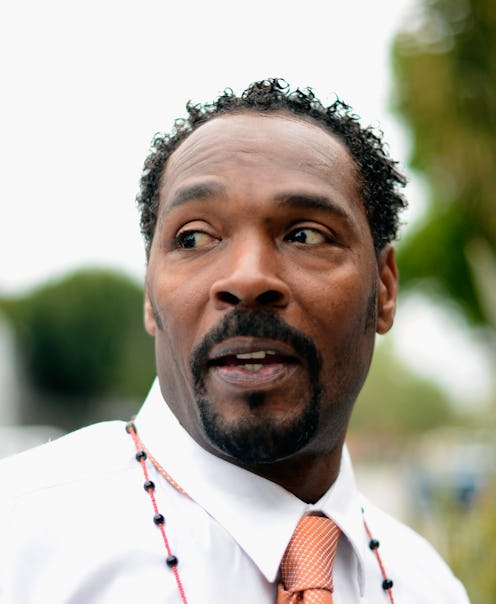In its five-part docuseries, ESPN's O.J.: Made In America special delves into how O.J. Simpson got acquitted of murder only to later be found liable in civil court for Nicole Brown Simpson and Ron Goldman's deaths and ordered to pay $33.5 million in damages to their families. But, Simpson's trial isn't the only to make an appearance in the series. The Rodney King verdict had been delivered only years earlier, and, as reported by Time, the racial issues brought on by that trial were integral to the Simpson case. We all know how the Simpson case turned out, but what of Rodney King? What happened to Rodney King after his trial?
According to ABC News, on the night of March 3, 1991, Rodney King and a friend led a group of California Highway Patrol officers on a high-speed car chase throughout the streets of Los Angeles. Upon apprehension, four officers arrested King and, according to the Los Angeles Times, amateur cameraman George Holliday caught the whole thing from his balcony. In the footage, police officers can be seen hitting King with their batons, fists, and feet, and, by March 4, 1991, the video went the 1990s version of viral — on every television screen in the country.
The same day, as reported by ABC News, the four officers were arrested and charged with assault. ABC News reported they would later plead “not guilty," and, on April 29, 1992, all four officers were acquitted. The same day, restless crowds gathered, looting occurred, and Los Angeles began to burn. Two days later, according to ABC News, President George H.W. Bush addressed the country to speak on the federal response to the Los Angeles riots, and video footage shows King had something to say, too — “Can’t we all just get along?”
Eventually, the riots stopped, but Los Angeles did not heal overnight. According to the Los Angeles Times, two of the officers involved in the King beating — officers Stacey C. Koon and Laurence M. Powell — received guilty verdicts for violating King’s civil rights and were sentenced to two-and-a-half years in jail, according to the New York Times. Officers Theodore J. Briseno and Timothy E. Wind are acquitted, according to the LA Times. The paper reported that King, however, received $3.8 million in a civil lawsuit against the city of Los Angeles. According to ABC News, King would later tell the Associated Press that he lost all of the money in bad investments.
After the incident, King had a string of brushes with the law. Among them include these incidents: In 1993 King was convicted of driving under the influence of alcohol after he crashed a car in Downtown Los Angeles, according to a separate LA Times article. Another Times article reported that in 1995, "He was sentenced to 90 days in jail after being convicted of hit and run." That same article reported that, in 1999, King was sentenced to jail for 90 days and put on probation "after a domestic dispute involving one of his daughters and her mother." The Times article also reported that, in 2003, after another car crash, "He pleaded guilty to being under the influence of PCP."
Later in life, King participated in the reality show Celebrity Rehab with Dr. Drew in 2008. In 2012, King released a memoir, The Riot Within: My Journey From Rebellion to Redemption, and made a statement on the 20th anniversary of the Los Angeles riots. He said to CNN: "Yes, I have forgiven [the officers] because I have been forgiven so many times. My country's been good to me, and I've done some things that wasn't pleasant in my lifetime, and I've been forgiven for that."
On June 17, 2012, King was found dead in his swimming pool, according to CNN, and the outlet reported that King’s death was ruled an accidental drowning, with alcohol, PCP, and cocaine found in his system.
Though his effect on the O.J. Simpson trial can’t be measured, King’s name is synonymous with a fraught time in Los Angeles’ history. Fraught, but important. It brought to life the racial tensions that bubbled under the country’s surface, and put a spotlight on important issues that needed to be talked about. For that, his memory will live on forever.
